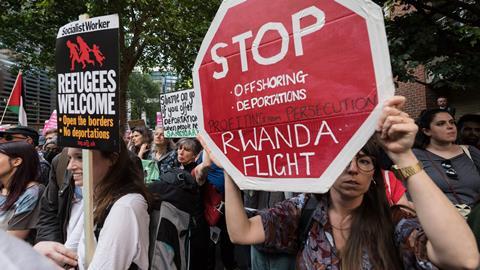The government has been defeated in the Court of Appeal over its plans to send asylum seekers to Rwanda, where their applications would be determined. However, handing down judgment in Court 71 at the Royal Courts of Justice this morning, the lord chief justice revealed a split decision.
Today’s judgment reverses the High Court’s decision that Rwanda was a safe third county. ‘Unless and until deficiencies in its asylum process are corrected, removal of asylum seekers to Rwanda will be unlawful,’ Lord Burnett of Maldon said.
The appeal, brought by asylum seekers from Syria, Iraq, Iran, Vietnam, Sudan and Albania, and charity Asylum Aid, were heard by Burnett, master of the rolls Sir Geoffrey Vos, and lord justice Underhill, vice-president of the Court of Appeal’s civil division.
Vos and Underhill concluded that deficiencies in Rwanda’s asylum were such that there were substantial grounds for believing ‘there would be a real risk of asylum seekers sent to Rwanda being returned to their home countries where they faced persecution and other inhumane treatment when in fact they had a good claim for asylum. ‘In that sense, Rwanda is not a safe country,’ Lord Burnett told the court.
However, the lord chief justice reached the opposite conclusion. Agreeing with the High Court’s decision, Burnett said he believed the procedures in place under the Rwanda agreement and assurances given by Rwanda’s government were sufficient that there was no real risk of asylum seekers being returned to their home countries where they faced persecution or inhuman treatment.
Burnett said the chances of asylum seekers being returned to their countries of origin were low because Rwanda had no agreement with those countries. ‘Extensive monitoring arrangements of those sent to Rwanda and their asylum applications provided lawful protection. Arrangements put in place provide sufficient safeguards’.
While the appeal was upheld, Burnett stressed the appeal court was not giving a view on the political merits of the Rwanda policy. ‘Our concern is only whether the policy complies with the law as laid down by parliament’.
Today’s judgment does not necessarily mark the end of the legal feud over the government’s immigration plan, with the court setting a tight timetable for consequential matters that includes the prospect of an application for the dispute to be heard by the Supreme Court.
The Court of Appeal's judgment was published immediately after this morning's short hearing.
Home secretary Suella Braverman said: 'While we are disappointed with their ruling in relation to Rwanda’s asylum system, I will be seeking permission to appeal this. I remain fully committed to this policy as does the Rwandan government.'
Writing in the Spectator today, legal commentator Joshua Rozenberg notes that the government has a week to put in its grounds of appeal, 'and we can expect a decision on permission during July'. He predicts that a full hearing before the Supreme Court might be scheduled for late September or October.
This article is now closed for comment.




























15 Readers' comments